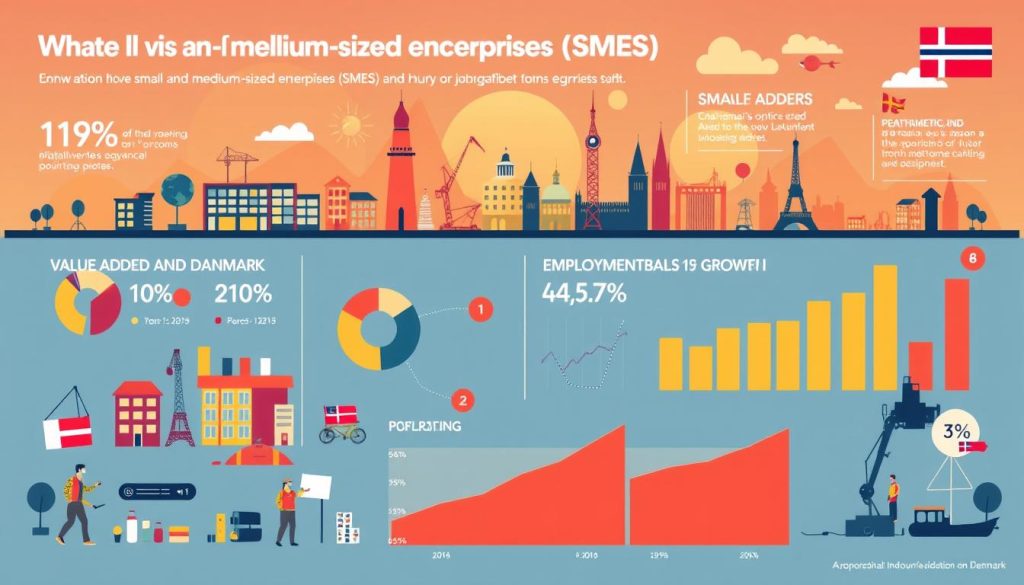Structural business statistics (SBS) are key to understanding Denmark’s economic framework. They give us detailed insights into business performance and activities. This helps us see trends across the EU business sector.
These statistics help us make better policy decisions. They also make it easy for the public and researchers to access important business data.
Looking closer, we see that SBS uses the NACE classification system. This system covers a wide range of sectors, like industry, construction, and services. It helps us understand value creation and investment trends clearly.
The Importance of Structural Business Statistics in Denmark
Understanding structural business statistics is key for deep economic analysis in Denmark. These stats give us insights into the business world. They help us see how economic activities work, which is vital for making policies and plans.
Understanding Economic Activity
Structural business statistics show us important data on Denmark’s economic activities. They tell us about new businesses, how they grow, and how long they last. This information helps us understand market trends and economic conditions, guiding our future plans.
Supporting Policy Decision-Making
Policymakers need strong business data to make informed decisions. Using structural business statistics in policy-making ensures strategies are evidence-based. This helps identify areas needing support, improving Denmark’s business environment.
Public Access to Business Data
Making business data public promotes transparency and informed citizens. It helps entrepreneurs make better decisions, boosting their success chances. In Denmark, these statistics are crucial for connecting government efforts with the business world, supporting a strong economy.

Overview of Denmark’s Business Economy
Denmark’s business scene is full of different types of companies. This shows the country’s dedication to supporting new and green business ideas. By 2022, there were 417,137 businesses, with 57,006 of them being groups.
This shows how strong Denmark’s business world is. It also shows why we need to look at business stats to understand the economy.
Key Figures of Enterprises
Small to medium-sized businesses (SMEs) are the biggest part of Denmark’s business world. Micro businesses, with less than ten workers, make up 93.2% of all businesses. This shows Denmark is full of entrepreneurs.
These small businesses are very important for the economy. They add more than 50% of the value in the economy. This shows how crucial they are for growth and stability.
Breakdown of Enterprises by Size and Sector
Looking at how big businesses are helps us understand Denmark’s economy better. Most businesses are small or micro. This helps us see how they create jobs and add to the economy.
By looking at these numbers, we see how important small businesses are. They help shape the economy and adapt to changes.
Structural Business Statistics in Denmark
Understanding Denmark’s business statistics gives us key insights into its economy. In 2022, the business economy added a huge €10,047 billion in value. The manufacturing sector was the biggest, adding €2,420 billion, and employing over 29.8 million people.
Analysis of Value Added and Employment
The manufacturing sector alone provided jobs for about 30 million people in 2022. Distributive trades were the second-largest employer, adding €1,591 billion in value. There are big differences in productivity across sectors, affecting the economy’s overall performance.
Sectoral Contributions to the Economy
Services activities were the biggest part of the non-financial business economy in the EU. Distributive trades made up 18.1% of businesses, and professional services made up 15.6%. Human health and social work activities were 7.3%. These sectors are key to the economy’s structure and value added.
Insights into SMEs’ Role
SMEs in Denmark are vital to the economy. Over 99.8% of businesses are small or medium-sized. They create about 50.2% of the value added and employ 63.4% of the workforce. This shows how important SMEs are for jobs and economic growth in Denmark.

Growth Trends and Economic Indicators
It’s important to understand Denmark’s economic growth and indicators. Our annual GDP was 2,805 billion DKK in 2023. This shows a 2.4% growth rate, which is a bit lower than before but still good.
The economy grew by 1.2% in Q3 2024. This shows our economy is strong, even when things outside change a lot.
Quarterly and Annual GDP Figures
Our GDP has grown thanks to big investments and changes in inventories. These are key signs of economic growth. Looking ahead, we expect GDP to grow by 2.4% in 2024, 2.5% in 2025, and 1.8% in 2026.
Investment and Labour Input Trends
Investment trends are key to understanding our economy. Private spending is expected to increase as incomes rise. Business investments will also grow in 2025 and 2026, thanks to lower interest rates.
Employment is set to grow by 0.8% in 2024. But, growth will slow down in later years. This is to help ease the current job market challenges. Investments and jobs are closely linked, showing how they both affect our economy.

